| Reviews & Columns |
|
Reviews DVD TV on DVD Blu-ray 4K UHD International DVDs In Theaters Reviews by Studio Video Games Features Collector Series DVDs Easter Egg Database Interviews DVD Talk Radio Feature Articles Columns Anime Talk DVD Savant Horror DVDs The M.O.D. Squad Art House HD Talk Silent DVD
|
DVD Talk Forum |
|
|
| Resources |
|
DVD Price Search Customer Service #'s RCE Info Links |
|
Columns
|
|
|
Rome - The Complete Second Season

INTRODUCTION:
In its first season, Rome set a new standard for historical television, immersing viewers into the daily life and political maneuvering of the Roman Republic in a way that had never been seen before. Beginning with Julius Caesar's victory over Vercingetorix in the Gallic Wars, it took us on a journey of the general's rise to dictatorship and his ultimate assassination on the Senate floor, told largely through the eyes of soldiers-turned-friends Lucius Vorenus (Kevin McKidd) and Titus Pullo (Ray Stevenson). Rome's second season picks up immediately where the first left off (March 15, 44 BC), and it chronicles the civil war and struggle for power after Caesar's death between the Optimates conspirators who had him killed, the remaining consul Mark Antony (James Purefoy), and the dictator's adopted son and heir Octavian (Max Pirkis, Simon Woods).
N.B.: This review assumes you have seen the first season and are familiar with the characters and specific plot points.
CONTENT:
The year is 44 BC, and dictator-for-life Julius Caesar is dead by the hands of Marcus Junius Brutus (Tobias Menzies) and his Liberatores. As co-consul, Mark Antony is technically in charge, but his loyalty to Caesar has made him a target for those conspirators less honorable than Brutus. Noting that not even a lion can withstand the attack of so many dogs, he prepares to flee the city with Caesar's niece Atia (Polly Walker), her children Octavia (Kerry Condon) and Octavian, and Caesar's widow Calpurnia (Haydn Gwynne). Calpurnia, however, insists that they remain in the city long enough to read her husband's will, and when it is revealed that most of his legacy has been passed on to Octavian, the cunning young man hatches a plan with Antony to defeat Brutus with the law. If Caesar is not declared a tyrant, then Brutus is a murderer and must be punished. If Caesar is declared a tyrant, then his appointments are nullified, and neither Brutus nor his co-conspirator Gaius Cassius Longinus (Guy Henry) hold any legal claim to power. The only possible solution then is a public truce with both Brutus and Antony eulogizing their fallen leader at his funeral. When Antony nearly incites a riot with a speech made famous in Shakespeare's play, the battle for supremacy begins.
Not to be forgotten, of course, are Rome's starring soldiers and the heart of the series, Vorenus and Pullo. After causing the death of his wife Niobe (Indira Varma), Vorenus descends into a pit of despair, cursing all of his children, not just the illegitimate son who was the focus of his anger, and embarking on a dark path of self-destruction. Pullo certainly is not about to leave the side of his brother-in-arms, but he has no answers for Vorenus and beseeches Mark Antony for guidance. Antony gives Vorenus purpose and places him in charge of the Aventine Collegium in the hopes of quelling the increased violence in the cities. A trade guild of sorts, the collegia are akin to the mafia, warring amongst themselves in a struggle to control the flow of commodities and the organized crime of the region. With Pullo as his first lieutenant, Vorenus is tasked with bringing these disparate groups together, presiding over the Aventine like Al Swearengen at the Gem Saloon. This new responsibility allows our two heroes to enjoy many more adventures throughout the course of the season, and they continue to be a strong focus of the show.
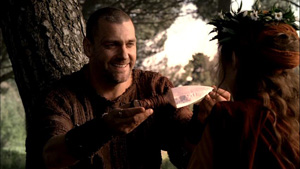
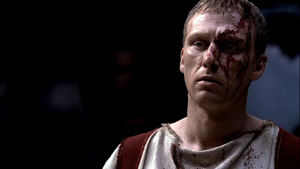
The set design, costuming, and cinematography are as spectacular as ever, but where this second season truly stands apart from the first is that the characterization is uniformly fantastic. During the first batch of episodes, Vorenus and Pullo were incredibly full of life, and there was fiery passion between the women of the powerful families (Atia and Servilia are in top form this season as well), but there was also a cold disconnect with more prominent individuals like Pompey and Caesar and many of the Senators. They never felt fully realized as characters and came across more like pawns in the historical record than individuals proceeding from personal motivations. As lesser characters from the first season are elevated in importance, that changes significantly, first and foremost with James Purefoy's delightful performance as Mark Antony. His brash arrogance and wry wit steal the show in early episodes, and it makes his famed departure to Egypt to align with Cleopatra (Lyndsey Marshal) all the more powerful.
Tobias Menzies and David Bamber also have more opportunity to shine in this season as the morally conflicted Brutus and the great orator Cicero, respectively. Menzies really captures the ranges of fear and duty and inner turmoil Brutus must face, while Bamber takes Cicero from the sniveling opportunist and elevates him into something more noble and dynamic. Atia's trusted bodyguard-slash-assassin Timon (Lee Boardman) is also brought into the forefront as we meet his family and find that torturing and killing Atia's enemies is not really what he hoped to do with his life. While Boardman is great in the role and Timon's journey helps link the story to Prince Herod of Judea (René Zagger), Timon's tale does feel a tad superfluous.
Many new additions to the cast thrive as well, chiefly among them Simon Woods as the older Octavian. The show could not continue with the youthful Pirkis in the role at this stage of Octavian's life, and the change in actor is handled quite effectively and in a very believable manner. Always at his side are his chief advisors, the legendary tactician Marcus Vipsanius Agrippa (Allen Leech) and the manipulative poet Gaius Cilnius Maecenas (Alex Wyndham). Each of these men has been largely fictionalized for the show, but the performances are great, and they really add some needed depth to Octavian's journey. Perhaps my favorite addition to the show is the wonderfully charismatic Gaia (Zuleikha Robinson). She joins the workforce at the Aventine as a brothel manager and creates all kinds of trouble for Vorenus and Pullo with her fiery personality and contempt for social order.
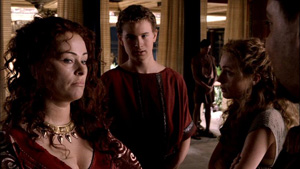
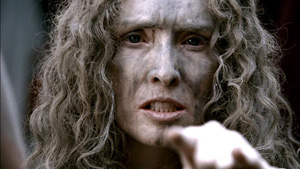
Another area that really impresses me about this season is the way in which it establishes a more coherent narrative. The first season covered a span of eight years and seemed difficult to follow at times, yet this season covers a period twice as long, with more characters and subplots (and even two fewer episodes!), and somehow it flows much better. It's a testament to the fabulous writing on this series that so much history could be crammed into such a short period of time and still maintain both coherency of plot and the emotional impact of the events that take place. Where the first season simply ignored the existence of Marcus Licinius Crassus and the First Triumvirate, this second season embraces the triumvirs and breathes life into Marcus Aemilius Lepidus (Ronan Vibert), even if it's never fully addressed how he came to power and why he becomes so insignificant.
And yet for all the praise I want to heap on this show, there are still a few issues I wish it could have handled better. The biggest of these is the structure of the Roman oligarchy. We are asked to take for granted that Antony and Octavian hold all this power, and I am fine with that, but it is never really clear what is going on in the Senate during all of this. It's important to know that Lepidus was elected co-consul with Julius Caesar and was a chief aide in the dictatorship, and that's why he's aligned with Octavian, or that Antony was co-consul when Caesar is assassinated, which makes him such a big threat. I recognize that it's not possible to cover every aspect of Roman politics, but a little more detail into the consulships would have gone a long way to understand what is taking place. I also wish there had been time to devote a little more to what Antony and Cleopatra accomplished (and failed to accomplish) together outside the palace walls. The way it's presented, there's a void in their story that seems out of place, and it somewhat rubbed me the wrong way that Antony's Alexandria Triumph and key moment in his war of public opinion with Octavian is reduced to a simple theft of his will by Posca (Nicholas Woodeson).
All of that said, Rome is a spectacular series, an epic achievement unlike anything that has ever been on television, and this second season is surprisingly even better than the first. All that was great about the first season remains with the addition of a stronger narrative, more emotionally involving characterization, a wonderful mid-season battle sequence, and even some nuggets of humor thrown in. There are times when Vorenus and Pullo seem a little too conveniently intertwined into the fate of Rome, and I would like to have seen more detail on the structure of the political machine, but these are the most minor of complaints. Rome's second season is fantastic.
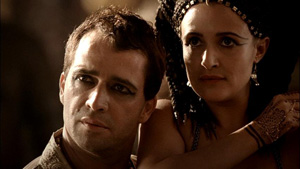
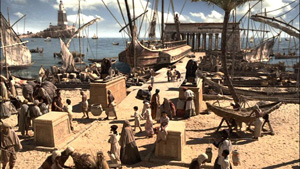
PRESENTATION:
When I reviewed the first season, it was pretty much the best television season presentation I had seen. While this one is a slight step back, not much has changed. The discs are once more packaged in a gorgeous wooden box, hinged in the upper left corner, that opens to reveal a 5-panel foldout with photos and episodes descriptions. The hinge mechanism is still thin, but my first season package is still in perfect condition, so maybe it's not an issue. There are only 10 episodes in this season, so it's 2 per disc, with the bonus features scattered throughout. Instead of featuring character pairs on the disc labels, a more uniform and minimalist design is used for this release, and the character guide has been replaced by an excerpt foldout promoting Jonathan Stamp's Rome book.
The video is presented in 16x9 widescreen with anamorphic enhancement, and it is stunning. Unfortunately, I did catch a couple of slight instances of edge enhancement during really bright outdoor scenes, so I cannot give it a perfect score, but you have to look very hard to find anything wrong with this. Colors and levels are fantastic.
Audio is available in English 5.1 and Spanish 2.0. Surround channels are not used as effectively as the first season, but the audio is clean and balanced, and the series sounds about as good as it possibly could.
Subtitles are available in English, French, and Spanish for the feature presentation only. The box claims there is closed captioning, but it did not work on my review copy.
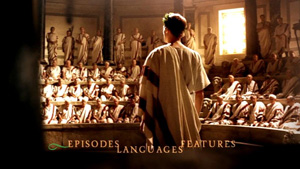
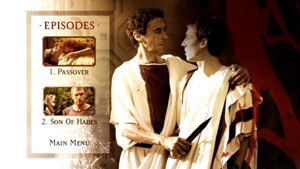
WHISTLES & BELLS:
Featurettes:
- "A Tale of Two Romes" (20:30)
- "The Making of Rome, Season II" (22:52)
- "The Rise of Octavian: Rome's First Emperor" (20:44)
- "Antony and Cleopatra" (14:48)
Each of these featurettes is exceptionally well done. "A Tale of Two Romes" starts with the founding of Rome in 753 BC and covers the seven hills, the significance of the Aventine and Palatine, the class structure, and the role of gods, drugs, and sex in Roman society. "The Making of Rome, Season II" is more of a behind-the-scenes on the show's production, specifically the incredible Collegium set and the Battle of Philippi. "The Rise of Octavian" and "Antony & Cleopatra" obviously covers these historical figures within the context of the series and beyond.
Text Commentary:
Historical consultant Jonathan Stamp is back with more text commentary on every episode in the "All Roads Lead to Rome" feature. It is every bit as informative and enjoyable as it was on the first season. Again, there is overlap between the text commentary and the audio commentary, but that's to be expected. Having such a knowledgeable expert providing so much information on this DVD really enhances the desire to own the set and watch it multiple times.
Audio Commentary:
- 2.01 - Passover (Creator Bruno Heller and Historical Consultant Jonathan Stamp)
- 2.07 - Death Mask (Director John Maybury and Lindsay Duncan)
- 2.08 - A Necessary Fiction (Executive Producer John Melfi and Director Carl Franklin)
- 2.09 - Deus Impeditio Esuritori Nullus (James Purefoy)
- 2.10 - De Patre Vostro (Creator Bruno Heller and Historical Consultant Jonathan Stamp)
The 8 commentaries from the first season have been reduced down to 5, and while the ones with Heller and Stamp are very informative, I particularly enjoyed James Purefoy on the penultimate episode of the season. It's an important episode for Mark Anthony, so he's a natural choice to do the commentary, but he carries a wealth of insight with him and presents it excellently on the commentary.
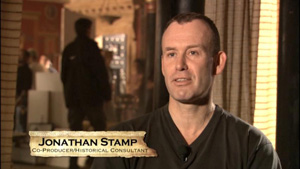
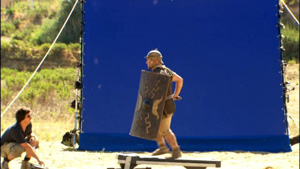
CONCLUDING THOUGHTS:
No one has ever attempted anything like Rome before, and I question whether anyone else ever will. It takes one of the most fascinating periods in the history of the world and distills it into something accessible and compelling for the casual viewer and history buff alike while presenting it with absolutely incredible production quality. This second season starts at the assassination of Julius and takes us through the ascension to power of Augustus, the cunning boy who would usher in Pax Romana and transition a republic into an empire. While I have a few very minor requests for even more historical depth, the characterization and plot flow and humor are all a step forward from the first season, and it is by far the most complete and impressive historical epic ever put together for television. It's expensive, but it's worth it. Highly Recommended
|
| Popular Reviews |
| Sponsored Links |
|
|
| Sponsored Links |
|
|
| Release List | Reviews | Shop | Newsletter | Forum | DVD Giveaways | Blu-Ray | Advertise |
|
Copyright 2024 DVDTalk.com All Rights Reserved. Legal Info, Privacy Policy, Terms of Use,
Manage Preferences,
Your Privacy Choices | |||||||













